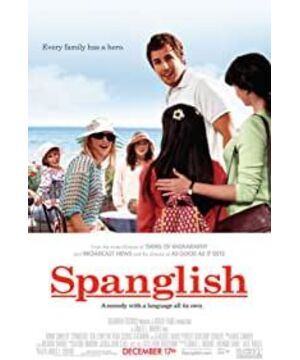Spanglish, Spanish-style English. The first time I heard about this movie was a recommendation from a classmate in my Spanish class, and since the topic was more appealing, I placed it high on my list of movies to watch.
This film has a lot of weirdness, and the one that strikes me the most weird is that it has to be metaphysical at the end, intending to sublimate the ambition of the theme. In my opinion, this ending is bizarre, so here I want to use Locke and Kant's philosophical theories to verify the plot of the movie.
First, the British empiricist philosopher Locke believes that the root of all human behavior and purpose is to seek their own happiness.
Everybody must always be moved, in action, solely by desire for his own happiness or pleasure.
But such happiness is not without boundaries and conditions, it must be ethical. In addition, Thomas Hobbes in his "Utopia" also expressed the correct assertion that people have the pursuit of what they love, which is similar to Locke's philosophy. Epicureanism in the later period of ancient Greece also had this tendency to some extent.
Second, Kant's Categorical Imperative can be used as a criterion to determine whether a thing conforms to a moral code:
Act only according to a maxim by which you can at the same time will that it shall become a general law.
Simply put, That is, when you are doing something, if most people in the same situation as you would choose A between A and B, then A is correct and ethical, and B is not.
In this film, it is understandable that the Mexican mother chooses to leave, and it is also in line with the above two theories. Although liking Adam Sandler would make her happy, it was immoral.
And the little girl's private school life with scholarship had to be sacrificed to a wrong love. To rationalize this fact, the Mexican mother asks a question that is both ontological and metaphysical, called the "basic question of life" in the film. Even if you put aside whether the little girl really understands or pretends to understand, the biggest problem is probably the conclusion the little girl draws. "My identity rests firmly and happily as my mother's daughter," she said.
Such an ending, according to Kang Lao's decree, is very suspicious. I am afraid that such a decision to hate her mother at the bus station with her front foot, and she is indeed in a very innocent situation, and the back foot immediately matches her mother, I am afraid it will not happen to the vast majority of children. In this way, if the girl's behavior is judged according to the law of certainty, she is obviously incorrect.
Then ask a little girl who later went to Princeton and was so strong about giving up her excellent education in a private school and her scholarship. Will she be happy? I'm afraid this little girl's firm belief that she is willing to be buried with her mother's wrong feelings is really strong. This is also really easy to suspect.
Some people may say that family is above all else, I am willing to give my mother the happiness I have, and I will be happier that way. Maybe there are such people. But as far as this little beautiful girl's personal situation is concerned, she can make such a huge understanding at such a young age, and can adjust her emotions so quickly and reunite with her mother. , I am afraid it can also be described as a drop in the bucket.
It should be noted that the fact that I cite these two theories does not mean that they are axioms that do not need to be proved. Therefore, the conclusions drawn may also be bizarre. In any case, this "movie review" is just a text to pass the time when you are bored, just for fun. Just personal opinion.
.
View more about Spanglish reviews











